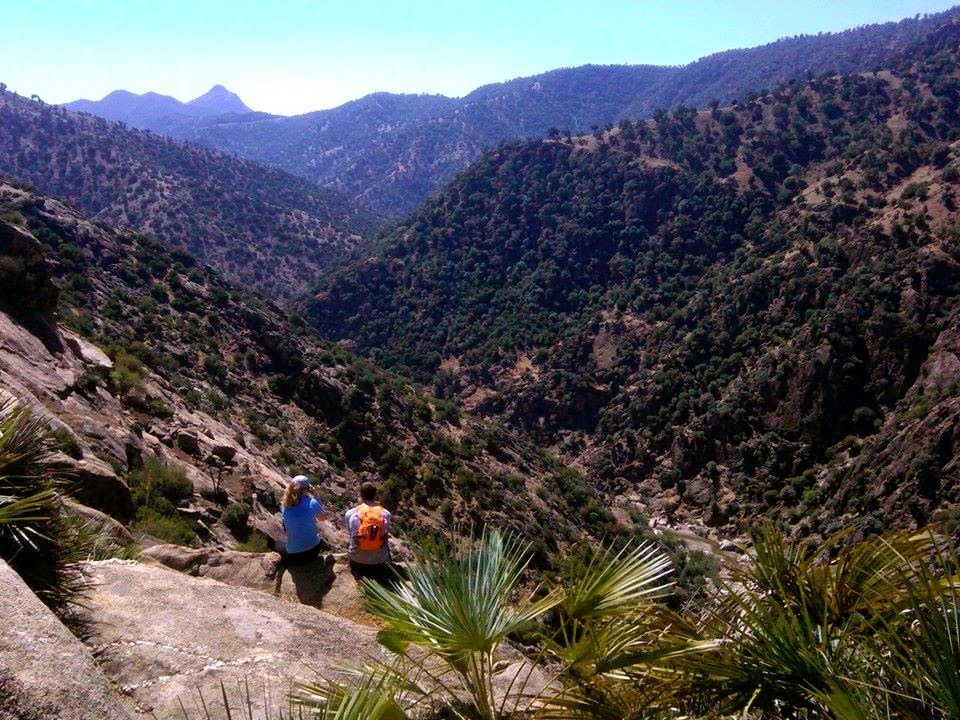First Stop: Beni Mallal
Photo Cred: Kristin Licciardello
Beni Mallah was first stop on the way to the high Atlas Mountains. This city boasts beautiful views and an impressive university. Not much can be said for its history though. After we visited the beautiful Kasbah and park, we learned that they had both been recently constructed in an effort by the city to create a history for itself. We spent the afternoon at the university and dialogued with several Moroccan students. In our discussion we learned the difference between Beldi (traditional, rural) and Romi (modern, western). Depending on your background, each carry a different connotation. In a big city such as Rabat, a person labeled Beldi would be considered dirty and uneducated. And in the mountains of Zawiya Ahansal, a Romi person would be considered untraditional and european.
Next Up: Zawiya Ahansal
 |
| Photo Cred: Carly Jean |
 |
| View from the Sheik's House Photo Cred: Carly Jean |
The Most Interesting Things I Learned:
- There are no policeman or law enforcement personnel for the 10,000-15,000 inhabitants. There hasn't been a need for them because crime is so low
- The population fluctuates by 5,000 twice a year when the nomadic people migrate
- The nomadic people usually cause a traffic jam of camels when they arrive in the Spring
- Most children stop going to school by 6th grade and work with their parents in the fields
- Usually the oldest son in the family will leave the village to work in a larger city and send money back to the commune. Other than him, most people live their entire lives never leaving Zawiya Ahansal
- Diabetes is a HUGE issue because the people aren't educated about nutrition
- The average family consumes 18 kilos of sugar per month in that village (family size ranges from 6-12)
- For lunch one day we were served bread, plain couscous, white pasta, rice, and potatoes. This is considered a balanced diet in the village
The most pressing question in my mind after learning all this was the protection of women's rights. Chloe and the Sheik are very proud of the fact that there is minimal crime in the village, but I couldn't help but wonder if certain crimes were just being kept under wraps. After pressing them more for information, I learned that certain women's rights groups come into the village every now and then to educate women on their rights. Ever since the 2004 amendment to the Mudawana (family law), the status of women has significantly improved. Chloe and other members of the commune said that they respect many of the new laws. The majority of families wait until their daughters are 18 (as the law demands) before marrying them off. They additionally stated that due to the poverty of the region, they simply cannot afford to put men on a higher pedestal. Men and women have the same jobs on a daily basis. But, after talking to Chloe more privately about the issue, I got the sense that issues such as domestic violence aren't talked about or even acknowledged as a problem. And due to the lack of police, there isn't a resource available for women to report such issues.
That night, the Shiek's cousin came to give us henna tattoos, and we joined a traditional Berber dance circle.
 |
| Photo Cred: Sreya Vaidyanathan |
 |
| Photo Cred: Sreya Vaidyanathan |
I was one of the few students who made it the full two and half hours in the dance circle. Chloe told us that usually dance circles go for the entire night. 8 hours of chanting, drumming, and moving slowly in the a circle to your right.
I also fell in love with the Sheik's child:
Last Stop Marrakech:
Marrakech was short and sweet, we were only there for the night and the morning. It was enough time to explore the square, shop in the souk, and play with a monkey. While I loved the city, it was clear that this is solely a tourist destination. The people in this city are presenting that Morocco they want us to see. The monkeys and snake charmers and horse drawn carriages serve no purpose except to entertain foreigners. I am much more excited for Fes, which I have been told is supposed to be the "real" Morocco.
Until next time!



